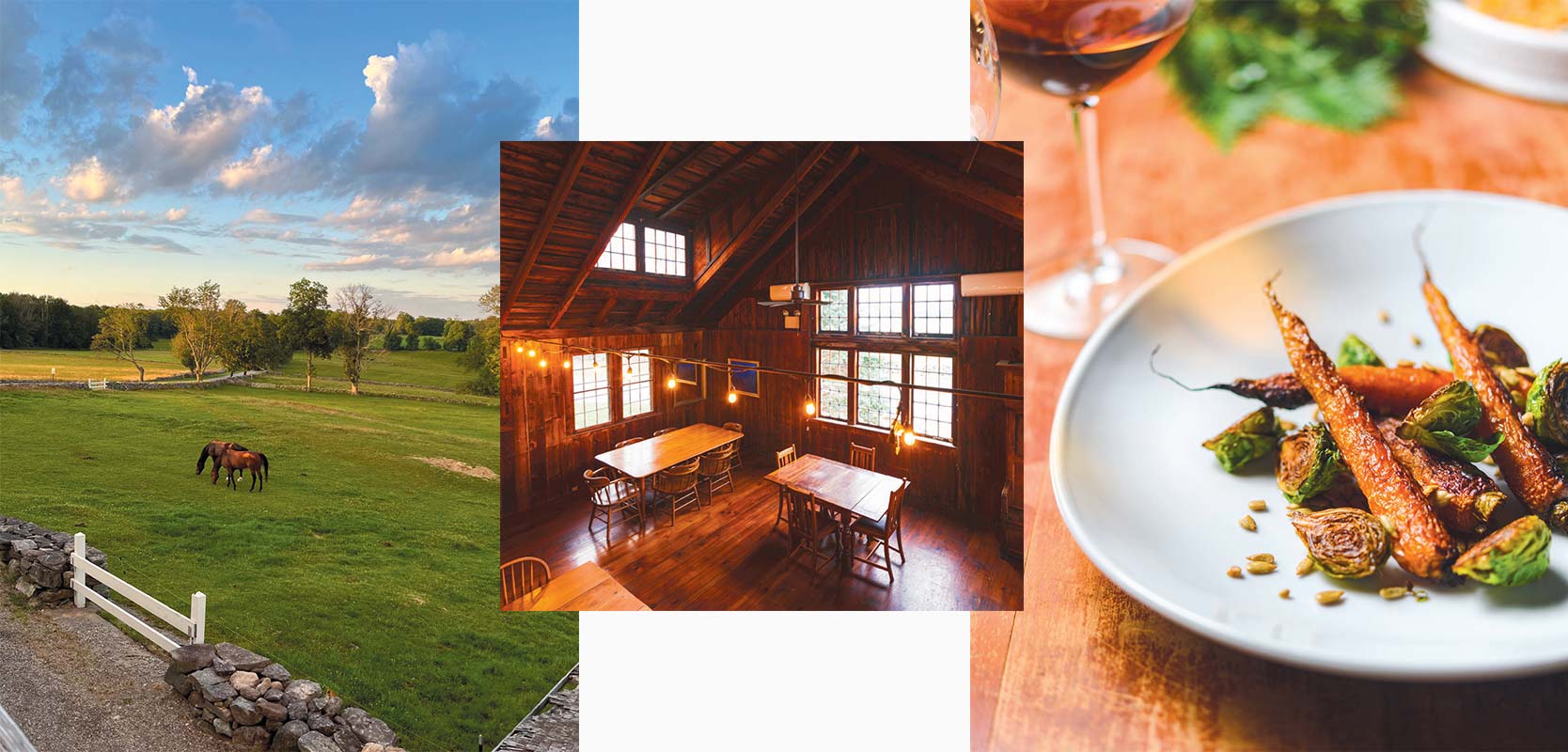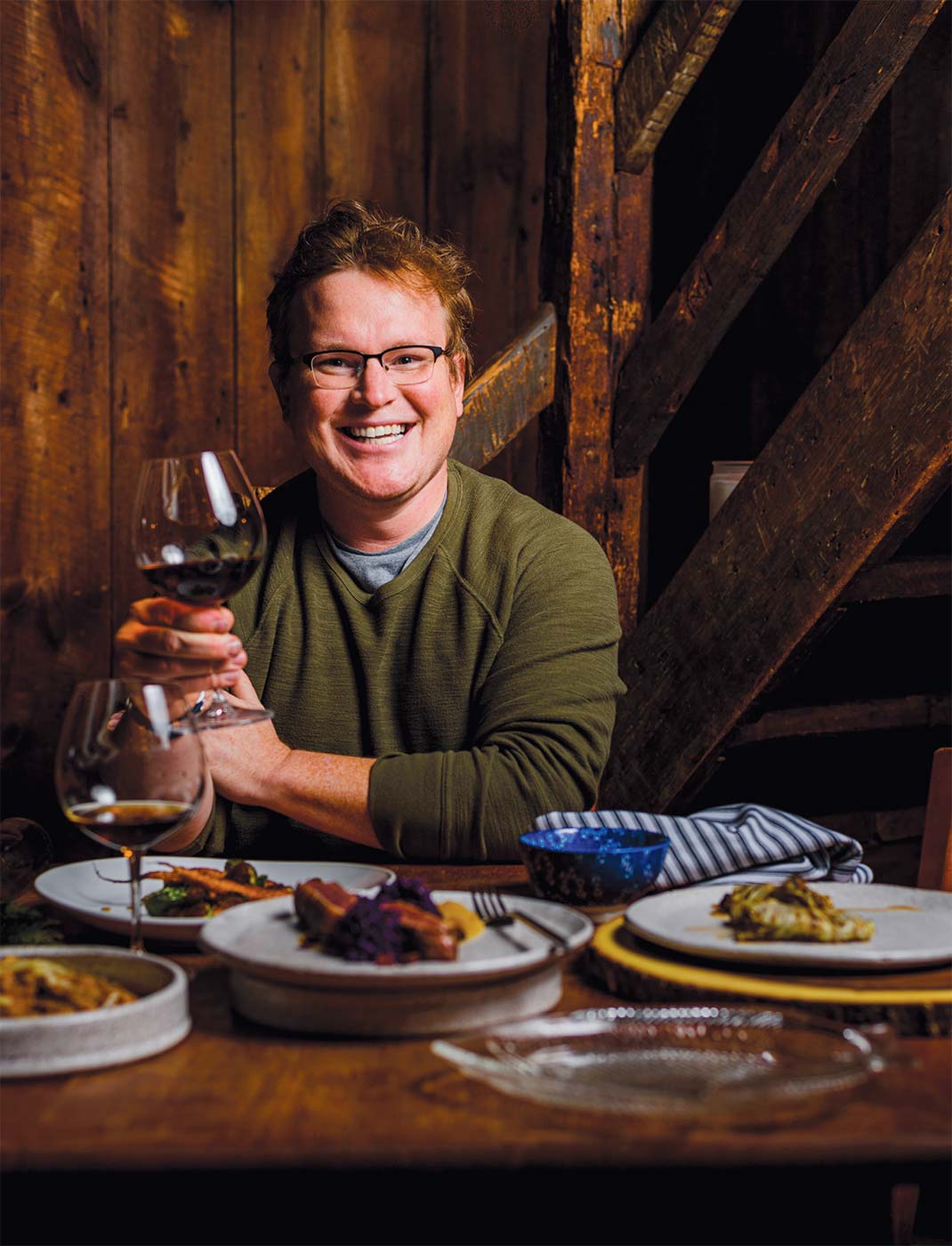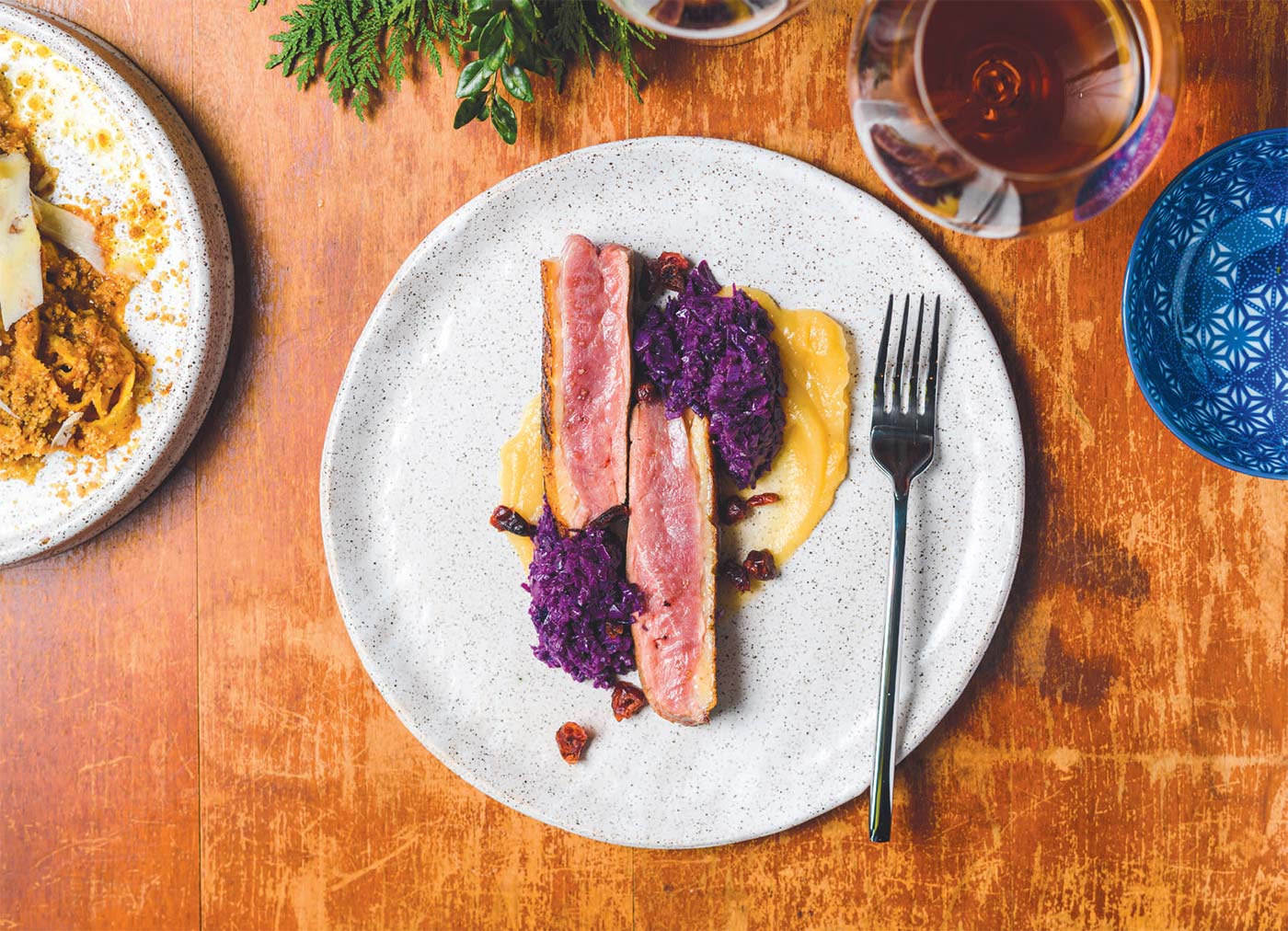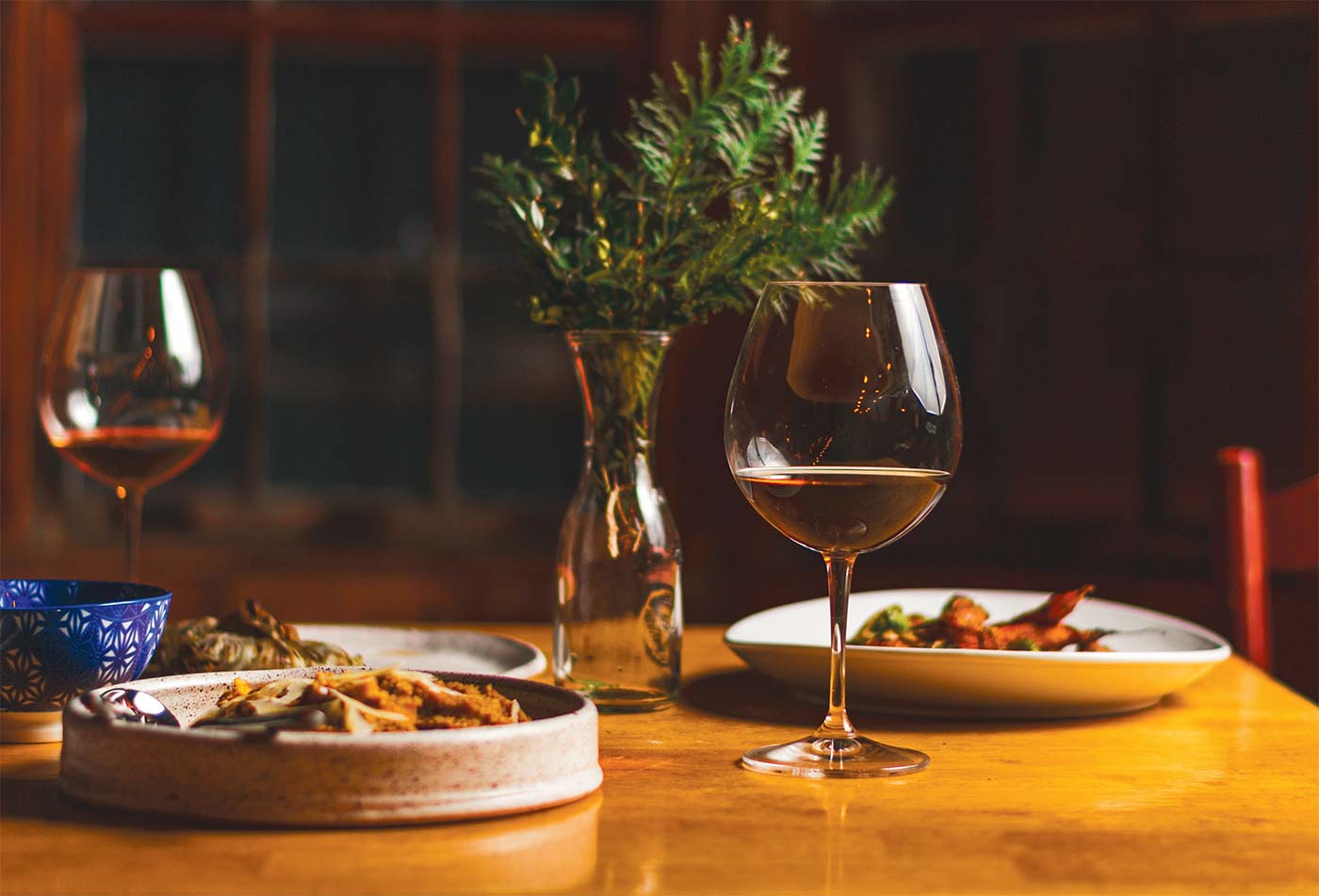Eating Very Locally at the Chef’s Table at Little Dipper Farm
The joke at the Chef’s Table, located on the 588-acre Little Dipper Farm in the rural hills of Brooklyn, CT, is that the vegetables walk across the street. “ e concept of food miles doesn’t count here,” says Sara Anderson Mooney, who runs the farm. “It’s more like food inches.” Chef/Owner Brian Paszko laughs and describes happily hauling kitchen compost back across the street to Sara’s garden. The Chef’s Table at Little Dipper Farm is helping to deepen the concept of farm-to-table dining.
There is good natured banter and an enthusiastic partnership in this new seed-to-plate enterprise in the pastoral hills of northeastern Connecticut. The Chef’s Table had a soft opening on December 8th. Now, at just two months old, they are already gaining a local following and glowing reviews from diners. A grand opening waits for warmer days in May or June, when they will expand from a 34-seat dining room into the now-chilly vaulted hall of the antique barn, with additional deck seating that overlooks rolling green fields and a lily-speckled pond. en they will serve spring’s bounty, now just seedlings in the greenhouse and a twinkle in the chef’s eye. In the meantime, Sara and Brian are learning the dance between farmer and chef to create beautiful, healthy, delicious meals using the most local and sustainable sources available.
In February at the Chef’s Table, diners really do get to meet their farmer because Sara is the hostess. “ The farmer is at the front door!” Brian says. “You got me until the grass gets green,” Sara teases. “Then she’s going to ghost me,” he retorts. Sara loves meeting guests and expects she is one of few farmers who gets to point directly at the plate and say proudly, “I grew that!”
Sara’s last farming gig was growing fresh produce for a convent kitchen in Wisconsin. “While the sisters were appreciative of the home-grown food, the food preparation was mostly midwestern, bland and uninventive--pretty much what you'd expect from a kitchen catering to a clientele in their eighties,” she says. “Seeing and tasting Brian's ingenious use of my humble veggies is beyond satisfying. He likes to come out to the gardens to scheme, seek inspiration, and make plans for what is looking best. This inclusion makes growing for the restaurant the best job a farmer could hope for.”
After gaining experience at a number of celebrated West Coast restaurants, Brian returned to hometown Boston to hone his skills in the city’s busy dining scene. Most recently, as Executive Chef at Alcove, Brian made “a passionate commitment” to sustainable and local sourcing. At Chef’s Table, he has even more access and control. Current vendors include Northeast Family Farms Cooperative (sustainably raised and humanely slaughtered meat) plus a few hyper- local sources, such as lamb from Granpa K Farm just down the road in Brooklyn and meat from Firefly Farms in North Stonington. Brian plans to research, visit farms, try products, and add more local sources as he gets to know the region better.

(left)An enchantng view of the bucolic farm; (middle)a view inside the warm dining room; (right)roasted carrots and Brussels sprouts

Chef Brian Paszko featuring seasonal dishes
“I’m coming from a big city restaurant world, where I had to deal with supply chain issues, staffing, questions like, ‘How do you adapt as a restaurant?’ I don’t want to deal with all that anymore,” says Brian. “I just want to work closely with my ingredients, my product, and my people. With this restaurant on the hill right across the street from the farm, we’re able to do that more than anyone else.”
Sara and Brian are excited about their partnership even as they’re still figuring it out. “We have to see who brings what to the table,” says Brian. “I have a million ideas and so does Sara. We just have to plan it, take the time to make decisions together, and see what works.” They can also improvise like crazy. This fall, while the barn was a chaotic mess of renovation, Brian built a wood fire outside and turned 50 pounds of ripe tomatoes into marinara and hot sauce. In the future, farm products - such as fresh bread, hand churned butter, sauces, teas, and much more - will be available for sale in an on-site market open to the public.
Little Dipper Farm was formerly Hillanddale Farm, home of the Golden Lamb Buttery, an OG farm-to-table restaurant offering quintessential New England in setting, food, and hospitality. Founded by Virginia (“Jimmie”) and Bob Booth in 1963, the Golden Lamb restaurant became a local icon, a country destination for city folk, and a place for occasional celebrity sightings. With traditions such as a hay wagon ride (including cocktails and live music) around the property before dinner, the Lamb was a special occasion venue. After running the restaurant into their 80s, Jimmie and Bob passed the torch to their granddaughter, Katie Bogert, who carried on the Golden Lamb tradition for several more years. Soon after the restaurant’s 55th anniversary, Katie decided to close. The family farm was sold to Venus and Lori Corriveau in September 2021.
Lori is originally from Washington, D.C. Her wife, Venus, grew up locally in Putnam. Venus knew the property would be a perfect setting for their entrepreneurial dream, which offers membership in a farm experience for people who wouldn’t normally have the chance. “Our vision for Little Dipper Farm was to create a unique environment where people can come to connect and enjoy experiences together, all centered around our sustainable farm,” says Lori.
“We envisioned giving guests the chance to help grow the food, learn about farming, share food grown and made here, and create meaningful moments and adventures in nature. We see so many possibilities, including making salsa with strangers, forest bathing, picking flowers, doing yoga overlooking a pasture with horses, hiking, kayaking, and biking on the property, and so much more.” Little Dipper Farm’s membership concept doesn’t mean it’s exclusive. Most events are open to the public. They will offer free garden and history tours, guided foraging, and more during The Last Green Valley’s annual “Spring Outdoors” event (see www.TLGV.org).
The Chef’s Table is currently open four nights a week by reservation only. They are also available for private events and catering. In the spring, expanded dining space will allow for walk-ins. The marketplace will offer visitors a chance to stop by during the day, grab a snack and enjoy the property—something that didn’t happen at the Golden Lamb. Sara wants visitors to visit the gardens, where diners can see where their food was just yesterday and plans to set up “Instagram friendly” photo opportunities.

Duck Rohan served with tangy-sweet braised red cabbage, rutabaga, and red currant sauce
On a chilly night in mid-February, I enjoyed dining at The Chef’s Table. I brought my friend Courtney--a farmer, a foodie, and an amazing cook trained in plant-based cuisine. Understated décor emphasizes the beautiful, rustic architecture of the antique barn. Our cozy table snuggled up to a crackling wood fire features a simple table setting and a centerpiece of mosses and fungi found on the property during winter. A playlist of live folk music curated by Brian takes advantage of the barn’s great acoustics. The always changing seasonal menu is sourced from the farm, made on the farm, or carefully curated from New England vendors.
“He really knows what he’s doing!” Courtney exclaims. Brian’s meals offer simple elements used in innovative ways with a perfect balance of seasoning, allowing fresh, local ingredients to shine. We start with Macomber turnip soup, and a crisp, cracker-like “bread” served with a cloud of butter freshly made on-site. I’m not a turnip fan but it reminds Courtney of family dinners, so we share some. The soup is mild, earthy, slightly sweet. “He has coaxed the best of the turnip out in this soup,” she says admiringly. Although we don’t order it, Brian sends a taste of duck cassoulet made with beans grown at nearby Lapsley Orchard. This hearty, savory classic elicits multiple “wows” from us.
Courtney is also impressed by the carrot-Brussel sprout salad. “How did you get the roasted carrot to form a pellicle?” she asks Brian, who likes to run food to tables and meet his diners. He seems pleased and surprised by her question. I learn that a pellicle is the chewy outer layer that separates smoked meat from its tender interior. I won’t reveal Brian’s secret to making roasted carrots that offer the delightful pop of biting a perfectly cooked sausage. You’ll have to dine at Chef’s Table and ask him!
We eat tender, medium-rare Duck Rohan served with tangy-sweet braised red cabbage, rutabaga, and red currant sauce, alongside homemade tagliatelle with rich, chewy oyster mushrooms, topped with fluffy dollops of homemade ricotta and a touch of shaved fresh black truffle. We finish with the silkiest, whisper-sweet panna cotta topped with winter citrus. I vow to return and to eat only this delectable dessert on my next visit. It’s that good!
Little Dipper Farm and the Chef’s Table radiate a warm, approachable ambiance. “We offer old fashioned hospitality but with a modern idea of where your food comes from,” says Brian. “I want people to feel comfortable here. We don’t want to be a one-time, special occasion place. Come in, trust us, have a meal. You’ll never hear a phone ring, never have a TV playing. There will be beautiful food on a plate that you can share.” Brian does not want to be the Golden Lamb 2.0. “Fifty years ago, the Lamb brought new ideas to this area and people embraced it.” Brian wants to emulate that but also let the Chef’s Table speak for itself and build a new story on the farm.
- The Chef's Table at Little Dipper Farm is located at 499 Wolf Den Road, Brooklyn. www.chefstableatldf.com www.littledipperfarm.org





